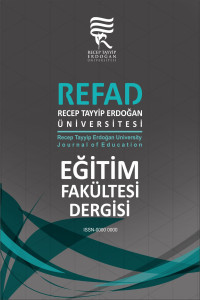Öğretmenlik Meslek Eğitiminde Müzik Kullanımı: Kişisel Bir Tecrübe
Eğitim, Müzik, Öğretmenlik Meslek Eğitimi
Using Music in Teaching Professional Education: A Personal Experience
Education, Music, Teaching Professional Training,
___
- Altıntaş, E. (2014). Çağdaş Eğitim Sisteminde Öğrenci Kişilik Hizmetleri ve Rehberlik, Psikolojik Danışmanlık ve Rehberlik, PEGEM, Ankara, s. 2-29.
- Atak, H , Kırman, T . (2020). Yabancılaşma: Kavramsal ve kuramsal bir değerlendirme . Kırıkkale Üniversitesi Sosyal Bilimler Dergisi , 10 (2) , 279-295.
- Cabedo-Mas, A., & Díaz-Gómez, M. (2013). Positive musical experiences in education: Music as a social praxis. Music Education Research, 15(4), 455-470.
- Fuchs, S. (2009). Against essentialism: A theory of culture and society. Harvard University Press.
- Gardner, H. (2006). The development and education of the mind: The selected works of Howard Gardner. Routledge.
- Gezgin, Mehmet F. (1997). Sosyal Yapı Açısından Genel Sosyoloji Köy Sosyolojisi İlişkileri, İstanbul Üniversitesi, Yayın No: 3925, İstanbul.
- Grebene, B. (1978). Müzikle Tedavi, Güven Kitabevi, Ankara
- Gross, J. J. (2008). Emotion regulation. Handbook of emotions, 3(3), 497-513.
- Güneş, A. (2014). Müziğin Doğuşu ve Tarihçesi, https://aytengunes.wordpress.com/2014/05/27/muzigin-dogusu-ve-tarihcesi/ (10.02.2021).
- Güvenç O. R. (2002). Eski Türklerde Müzik İle Tedavi. Türkler. Cilt 3. Ankara: Yeni Türkiye Yayınları; 2002. 460-467.
- Hruska, B. J. (2011). Using mastery goals in music to increase student motivation. Update: Applications of Research in Music Education, 30(1), 3-9.
- İpşiroğlu N. (1998). Sanattan Güncel Yaşama, Pan Yayıncılık, İstanbul
- Jaeggi, R. (2014). Alienation. Columbia University Press.
- Karagülle, A. E., Çayçı, B. (2014). Ağ Toplumunda Sosyalleşme ve Yabancılaşma, The Turkish Online Journal of Design, Art and Communication, (4) 1, s. 1-9.
- Kepçeoğlu, M. (1999). Psikolojik Danışma ve Rehberlik, Alkım Yayınları, İstanbul
- Kongar, E. (1995) Toplumsal Değişme Kuramları ve Türkiye Gerçeği, Remzi Kitabevi, İstanbul.
- Mannheim, K. (1993). From Karl Mannheim. Transaction Publishers.
- Masgoret, A. M., & Gardner, R. C. (2003). Attitudes, motivation, and second language learning: A meta‐analysis of studies conducted by Gardner and associates. Language learning, 53(S1), 167-210.
- McLaren, P., & Rikowski, G. (2016). Pedagogy for revolution against education for capital. This fist called my heart: The Peter McLaren reader, 1, 255-319.
- Ofluoğlu, G., Büyükyılmaz O. (2008). Yabancılaşmanın Teorik Gelişimi ve Tarihsel Süreç İçinde Farklı Alanlarda Görünümleri, Kamu-İş Dergisi, (10) 1, s. 113-144.
- Özgüven, E. İ. (2001). Ailede İletişim ve Yaşam, PDREM Yayınları, Ankara
- Şendurur, Y., Barış, D. (2002). Müzik Eğitimi ve Çocuklarda Bilişsel Başarı, G. Ü. Gazi Eğitim Fakültesi Dergisi, (22) 1, s. 165-174.
- Tan, H. (1992). Psikolojik Danışma ve Rehberlik, M.E.B. Yayınları Öğretmen Kitapları Dizisi İstanbul
- Tezcan, M. (1981). Kuşaklar Çatışması, Okuyan ve Çalışan Gençlik Üzerine Bir Araştırma, Ankara
- Thoma, M. V., Ryf, S., Mohiyeddini, C., Ehlert, U., & Nater, U. M. (2012). Emotion regulation through listening to music in everyday situations. Cognition & emotion, 26(3), 550-560.
- Uçan A. (1996). İnan ve Müzik, İnsan ve Sanat Eğitimi, Müzik Ansiklopedisi Yayınları, Ankara
- Ünal, L. I. (2011). Öğretmenliğe ve öğretmen yetiştirmeye ilişkin ekonomi politik bir çözümleme. Türkiye’de öğretmen yetiştirme, 3-22.
- Wichmann, C., Coplan, R. J., & Daniels, T. (2004). The social cognitions of socially withdrawn children. Social Development, 13(3), 377-392.
- Başlangıç: 2021
- Yayıncı: Recep Tayyip Erdoğan Üniversitesi
Öğrenme-Öğretme Sürecinde Eğitsel Oyunlar Tekniğinin Kullanılmasına İlişkin Öğretmen Görüşleri
Zeynep DEMİRTAŞ, Müfide ÇALIK, Sevilay SARIŞIK, Salih SARIŞIK
Sınıf Öğretmenlerinin Yaratıcı Drama ve Değerlere İlişkin Metaforik Algıları
Seher YARAR KAPTAN, Ayşegül OĞUZ NAMDAR
Dil Bilgisi Öğretimine İlişkin Öğretmen ve Öğrenci Görüşleri
Sibel EKŞİ, Nuhaşan KIR, Ahmet BENZER
Öğretmenlik Meslek Eğitiminde Müzik Kullanımı: Kişisel Bir Tecrübe
